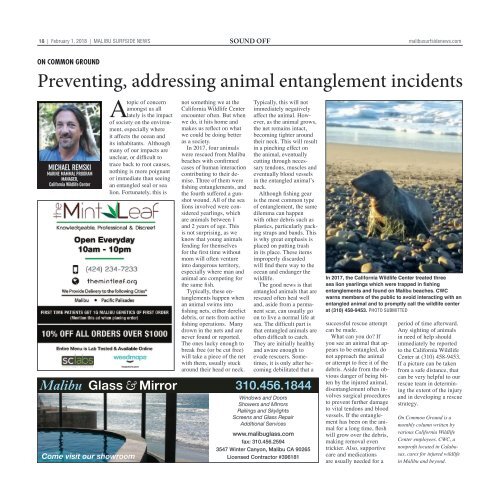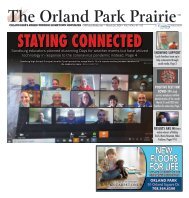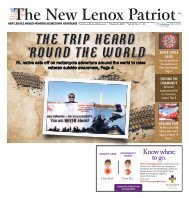MSN_020118
Malibu Surfside News 020118
Malibu Surfside News 020118
Create successful ePaper yourself
Turn your PDF publications into a flip-book with our unique Google optimized e-Paper software.
18 | February 1, 2018 | Malibu surfside news Sound Off<br />
malibusurfsidenews.com<br />
On Common Ground<br />
Preventing, addressing animal entanglement incidents<br />
Michael Remski<br />
Marine Mammal Program<br />
Manager,<br />
California Wildlife Center<br />
A<br />
topic of concern<br />
amongst us all<br />
lately is the impact<br />
of society on the environment,<br />
especially where<br />
it affects the ocean and<br />
its inhabitants. Although<br />
many of our impacts are<br />
unclear, or difficult to<br />
trace back to root causes,<br />
nothing is more poignant<br />
or immediate than seeing<br />
an entangled seal or sea<br />
lion. Fortunately, this is<br />
not something we at the<br />
California Wildlife Center<br />
encounter often. But when<br />
we do, it hits home and<br />
makes us reflect on what<br />
we could be doing better<br />
as a society.<br />
In 2017, four animals<br />
were rescued from Malibu<br />
beaches with confirmed<br />
cases of human interaction<br />
contributing to their demise.<br />
Three of them were<br />
fishing entanglements, and<br />
the fourth suffered a gunshot<br />
wound. All of the sea<br />
lions involved were considered<br />
yearlings, which<br />
are animals between 1<br />
and 2 years of age. This<br />
is not surprising, as we<br />
know that young animals<br />
fending for themselves<br />
for the first time without<br />
mom will often venture<br />
into dangerous territory,<br />
especially where man and<br />
animal are competing for<br />
the same fish.<br />
Typically, these entanglements<br />
happen when<br />
an animal swims into<br />
fishing nets, either derelict<br />
debris, or nets from active<br />
fishing operations. Many<br />
drown in the nets and are<br />
never found or reported.<br />
The ones lucky enough to<br />
break free (or be cut free)<br />
will take a piece of the net<br />
with them, usually stuck<br />
around their head or neck.<br />
Typically, this will not<br />
immediately negatively<br />
affect the animal. However,<br />
as the animal grows,<br />
the net remains intact,<br />
becoming tighter around<br />
their neck. This will result<br />
in a pinching effect on<br />
the animal, eventually<br />
cutting through necessary<br />
tendons, muscles and<br />
eventually blood vessels<br />
in the entangled animal’s<br />
neck.<br />
Although fishing gear<br />
is the most common type<br />
of entanglement, the same<br />
dilemma can happen<br />
with other debris such as<br />
plastics, particularly packing<br />
straps and bands. This<br />
is why great emphasis is<br />
placed on putting trash<br />
in its place. These items<br />
improperly discarded<br />
will find there way to the<br />
ocean and endanger the<br />
wildlife.<br />
The good news is that<br />
entangled animals that are<br />
rescued often heal well<br />
and, aside from a permanent<br />
scar, can usually go<br />
on to live a normal life at<br />
sea. The difficult part is<br />
that entangled animals are<br />
often difficult to catch.<br />
They are initially healthy<br />
and aware enough to<br />
evade rescuers. Sometimes,<br />
it is only after becoming<br />
debilitated that a<br />
Malibu Glass & Mirror 310.456.1844<br />
Come visit our showroom<br />
Windows and Doors<br />
Showers and MIrrors<br />
Railings and Skylights<br />
Screens and Glass Repair<br />
Additional Services<br />
www.malibuglass.com<br />
fax: 310.456.2594<br />
3547 Winter Canyon, Malibu CA 90265<br />
Licensed Contractor #396181<br />
In 2017, the California Wildlife Center treated three<br />
sea lion yearlings which were trapped in fishing<br />
entanglements and found on Malibu beaches. CWC<br />
warns members of the public to avoid interacting with an<br />
entangled animal and to promptly call the wildlife center<br />
at (310) 458-9453. Photo Submitted<br />
successful rescue attempt<br />
can be made.<br />
What can you do? If<br />
you see an animal that appears<br />
to be entangled, do<br />
not approach the animal<br />
or attempt to free it of the<br />
debris. Aside from the obvious<br />
danger of being bitten<br />
by the injured animal,<br />
disentanglement often involves<br />
surgical procedures<br />
to prevent further damage<br />
to vital tendons and blood<br />
vessels. If the entanglement<br />
has been on the animal<br />
for a long time, flesh<br />
will grow over the debris,<br />
making removal even<br />
trickier. Also, supportive<br />
care and medications<br />
are usually needed for a<br />
period of time afterward.<br />
Any sighting of animals<br />
in need of help should<br />
immediately be reported<br />
to the California Wildlife<br />
Center at (310) 458-9453.<br />
If a picture can be taken<br />
from a safe distance, that<br />
can be very helpful to our<br />
rescue team in determining<br />
the extent of the injury<br />
and in developing a rescue<br />
strategy.<br />
On Common Ground is a<br />
monthly column written by<br />
various California Wildlife<br />
Center employees. CWC, a<br />
nonprofit located in Calabasas,<br />
cares for injured wildlife<br />
in Malibu and beyond.


















